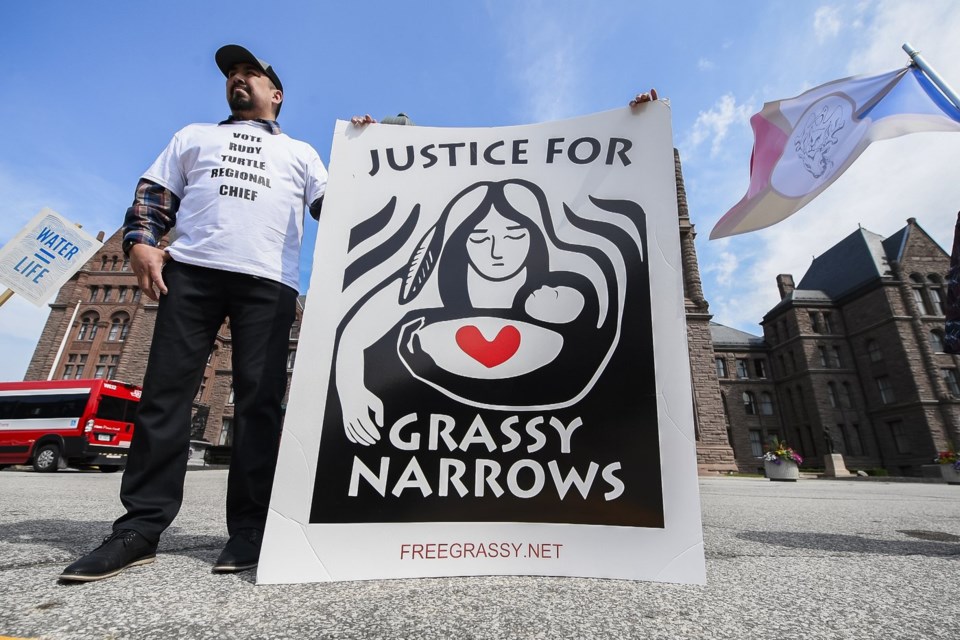TORONTO — Ontario's mining law and its system for registering mining claims have allowed thousands of claims to be staked on a northwestern First Nation without consultation or consent, the community alleges in a constitutional challenge announced Friday.
The Grassy Narrows First Nation, north of Kenora, Ont., is asking the court to declare that the province has a duty to consult and obtain its informed consent before registering or renewing mining claims on an area of its territory, and that the government has breached those duties.
It is also seeking an order that would halt all current and planned mining projects in the area until proper consultation takes place and consent is given.
If successful, the legal action could require the province to rescind thousands of existing mining claims the First Nation says have been staked on its lands without consultation or consent — and set a precedent that would affect mining projects throughout the province, according to Grassy Narrows.
"My people have suffered far too much from industry that has been forced on our land with devastating impacts to our health and way of life,” Chief Rudy Turtle of Grassy Narrows said in a written statement.
"Rather than listen to us, Ontario has granted thousands of mining claims on our land behind our backs. We only find out after the claims have been granted and after Ontario has given strangers a green light to carve up the land that we cherish and rely on," he said.
"This old law is outdated, unconstitutional and offensive."
Jackie Esmonde, a lawyer for Grassy Narrows, said the First Nation has long called for changes to the mining system.
"Grassy Narrows and, I would say, other Indigenous nations have been calling on Ontario to address this for some time. And given the lack of action, Grassy Narrows has had no choice but to bring this court application," she said Friday in a news conference at the provincial legislature.
A spokesperson for Ontario's attorney general said the province was served with a notice of application.
"As this matter is subject to litigation, it would be inappropriate to comment," Jack M. Fazzari wrote in a statement.
In an application to the court, the First Nation says it has identified an area on its lands where mining-related activities could have "direct adverse impacts" on its Aboriginal, treaty and inherent rights.
The application says Ontario's Mining Act doesn't require the province to consult or obtain consent before registering a claim or before assessment activities – which include building trails, trenching, drilling and other work – are carried out.
There has also been a boom in claims since 2018, coinciding with the province's introduction of an online system that allows anyone 18 or older to register a mining claim after obtaining a licence, which can be done by completing a one-hour online course and paying a $25 fee, it says.
There are about 10,000 mining claims in the area, the document says. Mining claims and tenures, including patents, leases and licences of occupation, cover nearly 30 per cent of the area, it says.
"There's a horseshoe about four and a half times the size of the city of Toronto around Grassy Narrows that is claimed for mining," Esmonde said.
Registering a claim and conducting an assessment are the first steps in the potential development of a mine and "have the potential to have serious adverse impacts upon Grassy Narrows rights," the application argues.
These include disturbing traplines and other lands and waters, damaging sacred landscapes and interfering with spiritual practices as well as land-based healing and cultural transmission, it says.
It also creates an increased risk of violence against Grassy Narrows members exercising their treaty rights, the document says. It particularly highlights the risk of gender-based violence due to the arrival of predominantly male workers on the territory.
The allegations have not been tested in court.
Last month, Grassy Narrows launched a lawsuit against the federal and provincial governments over mercury contamination in a river system that flows through its territory.
The lawsuit alleges the governments first allowed the English-Wabigoon river system to be contaminated, then failed to remediate it, all while authorizing industrial activities that worsened the harm.
The First Nation has been plagued by mercury poisoning since a mill upstream of the community dumped 9,000 kilograms of mercury into the English-Wabigoon River system in the 1960s.
The mill stopped using mercury in its industrial process in the 1970s, but mercury levels downstream of the plant have not significantly decreased since the 1980s.
This report by The Canadian Press was first published July 12, 2024.
Paola Loriggio, The Canadian Press



